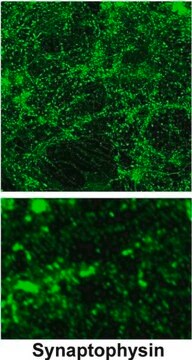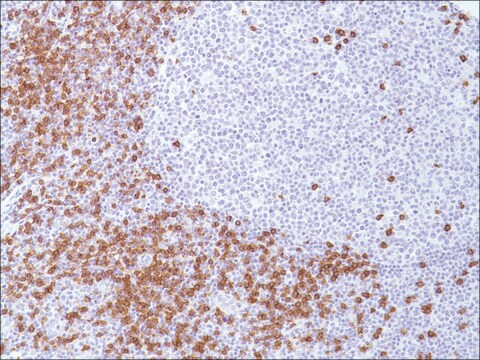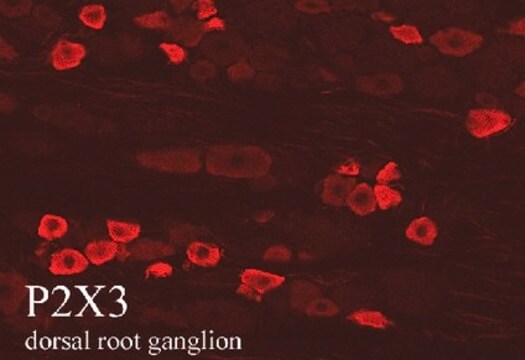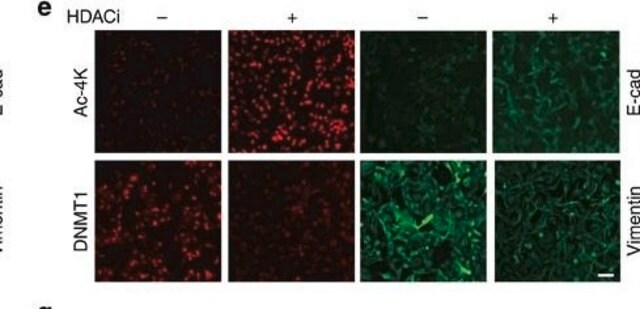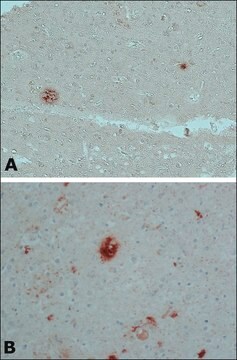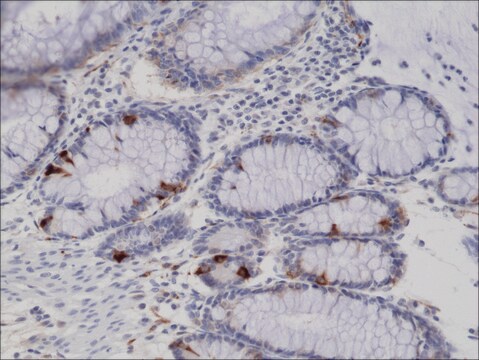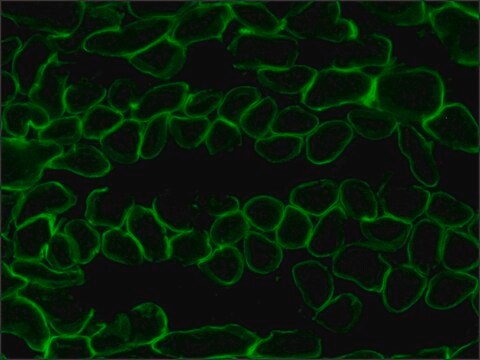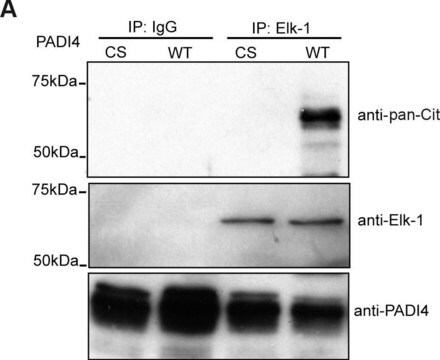SAB4200544
Anti-Synaptophysin antibody, Mouse monoclonal
clone SVP-38, purified from hybridoma cell culture
동의어(들):
Monoclonal Anti-MRXSYP, Monoclonal Anti-SYP, Monoclonal Anti-Synaptophysin1, Monoclonal Anti-Synaptoporin, Monoclonal Anti-Syp1, Monoclonal Anti-p38
로그인조직 및 계약 가격 보기
모든 사진(3)
About This Item
UNSPSC 코드:
12352203
NACRES:
NA.41
추천 제품
생물학적 소스
mouse
Quality Level
결합
unconjugated
항체 형태
purified immunoglobulin
항체 생산 유형
primary antibodies
클론
SVP-38, monoclonal
양식
buffered aqueous solution
분자량
antigen 38 kDa
종 반응성
rat, human
농도
~1.0 mg/mL
기술
immunohistochemistry: 10-20 μg/mL using formalin-fixed paraffin embedded rat cerebellum.
indirect immunofluorescence: 10-20 μg/mL using B35 cells.
western blot: 1-2 μg/mL using newborn rat brain extracts.
동형
IgG1
배송 상태
dry ice
저장 온도
−20°C
타겟 번역 후 변형
unmodified
유전자 정보
human ... SYP(6855)
일반 설명
Anti-Synaptophysin antibody, Mouse monoclonal (mouse IgG1 isotype) is derived from the hybridoma SVP-38 produced by the fusion of mouse myeloma cells and splenocytes from BALB/c mice immunized with a synaptosome preparation from rat retina. Synaptophysin is a glycoprotein containing four transmembrane domains with both N and C termini on the cytoplasm face.
Synaptophysin (SYP) is encoded by the gene mapped to human chromosome Xp11.23-p11.22. The encoded protein has a molecular mass of 38kDa and is exclusively localized to the membrane of presynaptic vesicles.
특이성
Anti-Synaptophysin antibody, Mouse monoclonal recognizes rat, human, guinea-pig, and pig synaptophysin
면역원
synaptosome preparation from rat retina. The isotype is determined by ELISA using Mouse Monoclonal Antibody Isotyping Reagents (Sigma ISO-2). The antibody is purified from culture supernatant of hybridoma cells grown in a bioreactor.
애플리케이션
Anti-Synaptophysin antibody, Mouse monoclonal has been used in following immunochemical techniques:
- Immunoblotting
- Immunohistochemistry
- Immunofluorescence
생화학적/생리학적 작용
Synaptophysin (SYP) facilitates neurotransmitter release and synaptic plasticity. It is also implicated in synaptic vesicle formation and exocytosis. Mutation in the gene increases the risk of susceptibility to schizophrenia. It is widely used as a potential marker to study the circulation of synapses in the brain and to discover the basic features of the life cycle of synaptic vesicles (SVs).
Synaptophysin has also been implicated in the recycling of synaptic vesicles by associating with dynamin I, a GTPase required for endocytosis.
물리적 형태
Solution in 0.01 M phosphate buffered saline, pH 7.4, containing 15 mM sodium azide.
면책조항
Unless otherwise stated in our catalog or other company documentation accompanying the product(s), our products are intended for research use only and are not to be used for any other purpose, which includes but is not limited to, unauthorized commercial uses, in vitro diagnostic uses, ex vivo or in vivo therapeutic uses or any type of consumption or application to humans or animals.
적합한 제품을 찾을 수 없으신가요?
당사의 제품 선택기 도구.을(를) 시도해 보세요.
Storage Class Code
10 - Combustible liquids
Flash Point (°F)
Not applicable
Flash Point (°C)
Not applicable
Regulation of synaptophysin degradation by mammalian homologues of seven in absentia
Wheeler TC, et al.
The Journal of Biological Chemistry, 277(12), 10273-10282 (2002)
Genetic and functional analyses of the gene encoding synaptophysin in schizophrenia.
Shen YC
Schizophrenia Research, 137, 14-19 (2012)
Post-translational processing of synaptophysin in the rat retina is disrupted by diabetes
DCruz TS, et al.
PLoS ONE, 7(9), e44711-e44711 (2012)
Sequence-based exon prediction around the synaptophysin locus reveals a gene-rich area containing novel genes in human proximal Xp.
Fisher SE
Genomics, 45, 340-347 (1997)
Association between SYP with attention-deficit/hyperactivity disorder in Chinese Han subjects: differences among subtypes and genders.
Liu L
Psychiatry Research, 210, 308-314 (2013)
자사의 과학자팀은 생명 과학, 재료 과학, 화학 합성, 크로마토그래피, 분석 및 기타 많은 영역을 포함한 모든 과학 분야에 경험이 있습니다..
고객지원팀으로 연락바랍니다.
